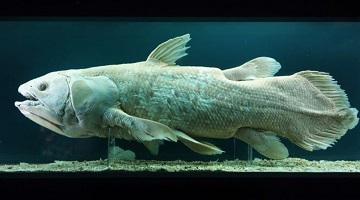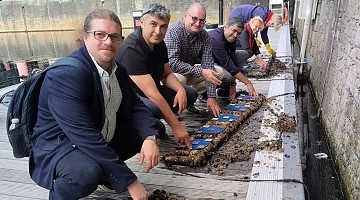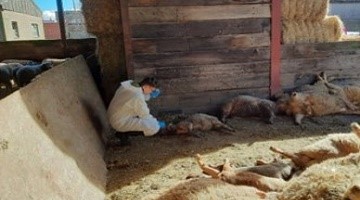Why study this course with LJMU?
- Accredited by the Royal Society of Biology
- Optional residential fieldwork (self-funded) at level 5 (possible destination Cairngorms National Park, Scotland) and Level 6 (possible destination Doñana National Park, Spain)
- Option to undertake a 4-6 week placement and/or a 12-month sandwich placement in the UK or overseas
- Easy access to local zoos and diverse habitat sites and ecosystems in North Wales, Lancashire, Snowdonia and the Lake District
- Excellent prospects in a diverse range of animal-related careers, including clinical and veterinary-related science, animal training, ecological consultancy, animal welfare and conservation, wildlife education, teaching and lecturing
- LJMU ranked 18th in the UK for Zoology (The Guardian University Guide 2025)
About your course
The professionally-accredited BSc (Hons) Zoology with Foundation Year at Liverpool John Moores University is the ideal course if you are interested in this subject but lack the necessary qualifications to study it at degree level.
About the Foundation Year
The Foundation Year is ideal if you have the ability to study for a degree but don't have the qualifications to enter directly onto the Zoology honours degree programme. Once you pass the Foundation Year you will progress directly onto the first year of the honours degree. If you are a full-time UK student, you will qualify for student financial support for the full duration of your course (subject to eligibility criteria).
About BSc (Hons) Zoology
Zoology is the scientific study of animals, both living and extinct. It encompasses all aspects of biology, from biochemistry and cell biology to ecology and behaviour, and examines animals in the context of their evolution and their environment, allowing you to specialise in your own areas of interest via placements, projects and modules in levels 5 and 6.
Practical hands-on experience is an important aspect of the course and we have a wealth of local facilities and fieldwork sites on our doorstep. These include three major zoological collections (Chester Zoo, Knowsley Safari Park and the Blue Planet Aquarium) as well as the diverse habitat sites of the North Wales and Lancashire coasts and inland ecosystems in Snowdonia and the Lake District.
One of the real bonuses of this course is the opportunity for residential fieldwork at Level 4 (core), Level 5 (optional) and Level 6 (optional). At Level 6 this is normally overseas and the possible destination is the Doñana National Park, Spain where you can learn ecological and behavioural field work skills.
These are in addition to further extended fieldwork opportunities through work placements of 4-6 weeks and/or a 12-month sandwich placement with a relevant organisation in the UK or overseas.
Course modules
What you will study on this degree
Please note that your choice of options may be subject to timetabling constraints.
Further guidance on modules
Modules are designated core or optional in accordance with professional body requirements, as applicable, and LJMU’s Academic Framework Regulations. Whilst you are required to study core modules, optional modules provide you with an element of choice. Their availability may vary and will be subject to meeting minimum student numbers.
Where changes to modules are necessary these will be communicated as appropriate.
Core modules
Core modules
Core modules
Optional Modules
Core modules
Optional Modules
Professional accreditation/links
This programme has been accredited by the Royal Society of Biology following an independent and rigorous assessment. Accredited degree programmes contain a solid academic foundation in biological knowledge and key skills, and prepare graduates to address the needs of employers. The accreditation criteria require evidence that graduates from accredited programmes meet defined sets of learning outcomes, including subject knowledge, technical ability and transferable skills.

Your Learning Experience
Excellent facilities and learning resources
We adopt an active blended learning approach, meaning you will experience a combination of face-to-face and online learning during your time at LJMU. This enables you to experience a rich and diverse learning experience and engage fully with your studies.
Teaching is mostly via lectures, in-person laboratory practicals and field trips. Additionally, small tutorial sessions provide a forum for discussing course material more informally. You will also have progress review meetings with your personal tutor. Our approach ensures that you can easily access support from your personal tutor, either by meeting them on-campus or via a video call to suit your needs.
Formal teaching accounts for approximately 14-18 hours of your study time each week; you will be expected to spend the rest of your time in private study.
Work-related Learning
As part of your work-related learning, you have the opportunity to undertake a short (4-6 week) work-based placement or a 12-month placement with a relevant organisation in the UK or abroad.
This work experience will not only give you a chance to put into practice what you have learnt at LJMU, it will also help you develop your personal skills, give you a years break from formal study and add real value to your CV. Many students who undertake placements have gone on to work for the same organisation once they have graduated.
Dedicated personal tutor, plus study skills support
Throughout your course you will have the support of a personal tutor who will be available to discuss course-related matters in both tutorial sessions and one-to-one progress review meetings. These meetings are to monitor your performance and identify action plans for improvement. A dedicated supervisor will also provide support during your research project and/or work-based learning, including visits to your workplace if you opt for the 12-month work placement.
The school is fully committed to promoting a learning environment that supports a culture of equality, diversity and inclusivity (EDI) and has an Enabling (Disability) Coordinator, an EDI Coordinator and a School EDI Working Group. Personal Tutors also play a vital role in promoting awareness of support services for students.
Assessment varies depending on the modules you choose, but will usually include a combination of exams and coursework.
All students perform differently depending on how they are assessed, which is why we use a combination of assessment methods. Exams may therefore include a range of question types e.g. multiple choice, short answer, interpretative, problem-based learning and essay. Coursework assessment could be in the form of online phase tests, fieldwork/practical reports, data handling, oral presentations, poster presentations, group discussions, essays or the evaluation of your practical skills. Most are based on individual assignments though some require group work.
Feedback on coursework assessments is normally provided within three weeks of submission and may be via Canvas, face-to-face or as written comments. We believe that constructive feedback is vital in helping you identify your strengths as well as the areas where you may need to put in more work.
Where you will study
You will study at the Byrom Street site in the university's City Campus in the heart of Liverpool. You will have access to first class teaching facilities, laboratories and study areas. The Avril Robarts library is within easy walking distance and here you'll find all the information you need to support your studies.
Course tutors

Dr Penny Oakland
Programme Leader
I find overseeing the progress of students and offering the necessary support and advice very rewarding. When graduates keep in touch to tell us about their exciting jobs working with animals it makes me feel proud to have played a part in their future career
I find overseeing the progress of students and offering the necessary support and advice very rewarding. When graduates keep in touch to tell us about their exciting jobs working with animals it makes me feel proud to have played a part in their future career
Penny studied BSc (Hons) Biology and completed a PhD in the structure and complexity of bird song: an evaluation of the Territorial Alliance Hypothesis. She is a member of the Association of the Study of Animal Behaviour and Fellow of the Higher Education Academy. Her interests cover all aspects of behavioural ecology wild, captive and domesticated animals, with a particular interest in behaviour, behaviour modification and the welfare of dogs, cats and horses.


I have just completed the Zoology degree and have been successful in securing a 12 month internship at Chester Zoo with the Birds Team! I wouldn’t be in the position I’m in now, nor would I have had the confidence to even apply for the internship, if it wasn’t for my time at LJMU. The support I have received from my lecturers and mentors has enabled me to follow my passion and ultimately achieve my dream of working with animals! I will be forever grateful for the unconditional support and guidance given to me.
Career paths
Some of our students continue on to postgraduate research degrees after graduation while others enter careers as diverse as embryology, clinical and veterinary science and wildlife conservation. Others choose to go into teaching or lecturing.
Graduates have secured full-time employment in the following roles (some after further study/training):
- Planning and Biodiversity Advisor, Natural England
- Senior Ecologist, United Utilities
- Research and Conservation Officer, Knowsley Safari Park
- Wildlife Consultant, SafeSky
- Team Manager (elephants), Chester Zoo
- Estate Manager, RSPB
- Inspector/Animal Welfare Officer/Rehoming Officer, RSPCA
- Animal Health Officer, Heathrow Animal Reception Centre
- Training Instructor, Dogs for Good
- Lead Conservation Scientist (Behaviour and Welfare), Chester Zoo
- Community Outreach Coordinator (Conservation), Auckland
- Research Assistant, Wellcome Trust, Sanger Institute
- Regulatory Scientist, Health and Safety Executive
- Virology and Stability analyst, AstraZeneca
- Scientist, BAE Systems
- Natural History Documentary Producer/Director, National Geographic
- Research Fellow (Sea Mammal Research Unit), University of St Andrews
- Veterinary Surgeon
- Veterinary Physiotherapist
- Pathology Operations Manager, Medical Research Council
- Project Management, Office for National Statistics
Others have opted for postgraduate study (PGCE, MSc, MPhil, PhD or other competitive undergraduate courses, such as medicine, veterinary science), have set up their own animal-related business or taken non-animal related graduate employment.
Student Futures - Careers, Employability and Enterprise Service
A wide range of opportunities and support is available to you, within and beyond your course, to ensure our students experience a transformation in their career trajectory. Every undergraduate curriculum includes Future Focus during Level 4, an e-learning resource and workshop designed to help you to develop your talents, passion and purpose.
Every student has access to Careers Zone 24/7, LJMU's suite of online Apps, resources and jobs board via the LJMU Student Futures website.
Tuition fees and funding
- Full-time per year:
- £9,535
- Placement year:
- £1,905
The University reserves the right to increase tuition fees in accordance with any changes to the maximum allowable fees set by the UK Parliament. In the event of such a change, any fee increase will be subject to a maximum cap of 10% of the total course cost as originally stated at the time of your offer.
The fees quoted above cover registration, tuition, supervision, assessment and examinations as well as:
- library membership with access to printed, multimedia and digital resources
- access to programme-appropriate software
- library and student IT support
- free on-campus wifi via eduroam
Additional costs
Although not all of the following are compulsory/relevant, you should keep in mind the costs of:
- accommodation and living expenditure
- books (should you wish to have your own copies)
- printing, photocopying and stationery
- PC/laptop (should you prefer to purchase your own for independent study and online learning activities)
- mobile phone/tablet (to access online services)
- field trips (travel and activity costs)
- placements (travel expenses and living costs)
- student visas (international students only)
- study abroad opportunities (travel costs, accommodation, visas and immunisations)
- academic conferences (travel costs)
- professional-body membership
- graduation (gown hire etc)
Funding
There are many ways to fund study for home and international students. From loans to International Scholarships and subject-specific funding, you'll find all of the information you need on our specialist funding pages.
Practical and field activities underpin all programmes in the School. PPE is provided for all necessary practical work. There are no costs for day field trips for core and optional modules. Residential field trips associated with the Level 4 core module include all travel and accommodation costs. Any residential field trips for optional modules will have costs involved. Locations may be subject to change and also subject to national and international travel restrictions.
A DBS check is not required for your application, however a DBS may be required for modules where there is a work based learning placement option. Work based learning placements that do not require a DBS check are available.
Entry requirements
Please choose your qualifications below to view requirements
Grades/points required from qualifications: DDD-CDD (72-80)
Work out how many UCAS points your qualifications are worth by visiting the UCAS Tariff Calculator.
Qualification requirements
How to apply
Securing your place at LJMU
UCAS is the official application route for our full-time undergraduate courses. Further information on the UCAS application process can be found here https://www.ljmu.ac.uk/study/undergraduate-students/how-to-apply.
Your university life
From accommodation and academic support to clubs and societies. Find out what LJMU has to offer.
Related Links
Talk to our students
Connect with a current LJMU student for advice and guidance on university life, courses and more.
See what our students are saying
At LJMU we want you to know you're making the right choice by studying with us. You can see what our students are saying about their experience with us through their reviews on the following websites:
Related Links
News and views
Browse through the latest news and stories from the university
The university reserves the right to withdraw or make alterations to a course and facilities if necessary; this may be because such changes are deemed to be beneficial to students, are minor in nature and unlikely to impact negatively upon students or become necessary due to circumstances beyond the control of the university. Where this does happen, the university operates a policy of consultation, advice and support to all enrolled students affected by the proposed change to their course or module.
Further information on the terms and conditions of any offer made, our admissions policy and the complaints and appeals process.





































